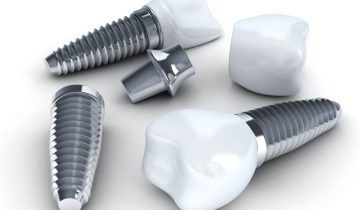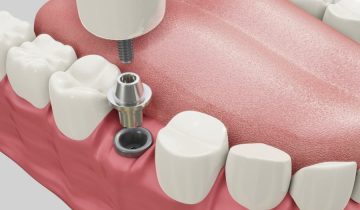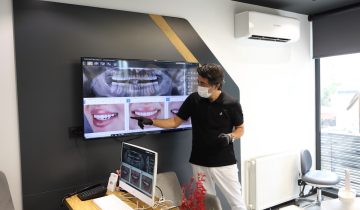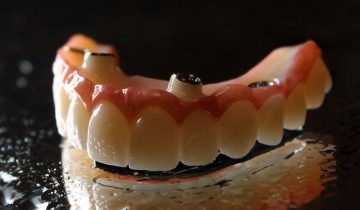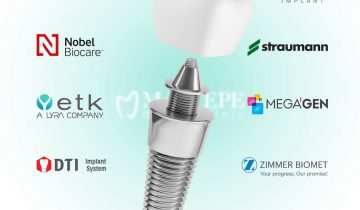Last updated on October 14th, 2023
All-on-4, also called All-on-Four or All on 4® Dental Implant, is a prosthodontics procedure in which all teeth are supported by four dental implants to provide total rehabilitation for totally toothless or nearly toothless patients.
All on four dental implant treatment is becoming a more integral part of prosthetic dentistry. The treatment is very promising since patients can get rid of many dental problems at once. Recovering the functionality and esthetics of a full mouth, all on four dental implants can give you one of the most special assets that you can have in life; your smile.
Year by year, our teeth wear down, and they get discolored, or more seriously, we have tooth decay or gum disease that leads to tooth loss. Thanks to the higher technology and awareness today, we can prevent many of these problems, or we can, at least, extend the functionality and good look of our teeth. However, some people may not be so careful about their teeth; or they care for their dental health, but some other factors might lead them to have the same dental problems.
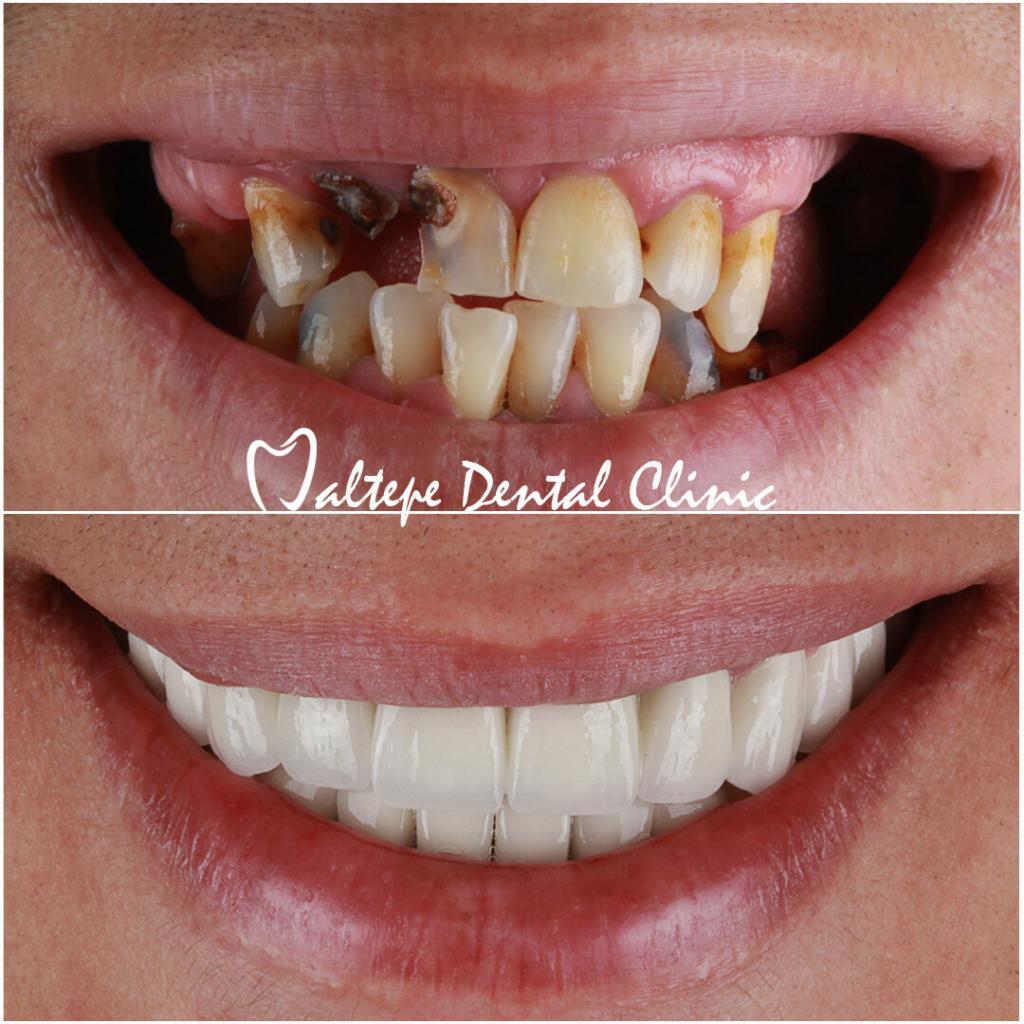
Fortunately, recovery is still possible. As part of this recovery, each tooth in your mouth might have a unique problem, or each tooth might need a specific treatment. This means lots of treatment time and higher costs. All-on-four dental implants, however, offer you a quick and affordable solution.
However, this is not a decision that you can give yourself. You should see your dental professional before taking any action. All-on-4 dental implants are applied as a last resort if other minor treatments will not help to recover your dental health. Therefore, a patient him/herself cannot know it.
This guide listed the most frequently asked questions about all-on-4 dental implants and briefly explained the answers. By reading the following guide, you can make up your mind much easier.
What Are All-On-4 Dental Implants?
All-on-four dental implants are good for edentulous patients since the procedure aims to replace all of the upper or lower set of teeth. Unlike the single dental implants or fixed bridge used for a single tooth, only four implants are used to attach the whole upper or lower teeth in all on four dental implant treatments.
Traditionally, when you have a single tooth loss for some reason, the dentist places one titanium screw into your gum so that he/she can put false teeth on it. However, the case is not that simple for some patients. When there are many teeth to be replaced, implanting them one by one is exhaustive both for the patient and the dentist. Thus, the dentist and the patient discuss all-on-4 dental implant treatment.
The technique used in all on four dental implants uses a permanent denture on which the teeth are put across. The denture is placed on four implants which are screwed in the jawbone at different angles. The different angles keep your denture robustly and give your teeth a seamless look so that your teeth look natural and strong.
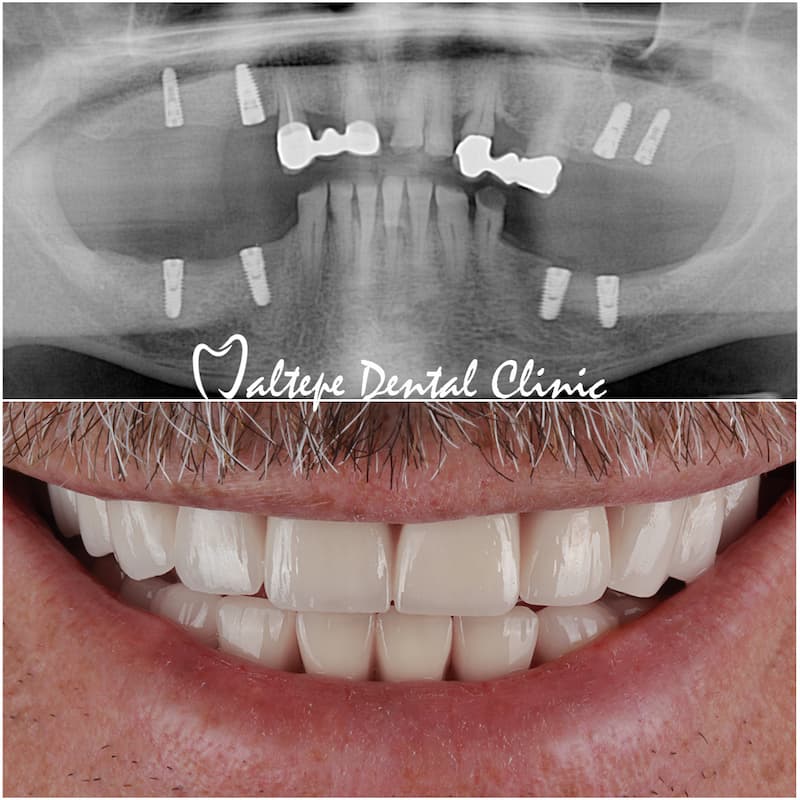
Who Needs All-On-4 Treatment?
All on four dental implants are highly advised to patients who have lost several of their teeth long before due to various reasons such as periodontal diseases. They need this treatment since, after years of toothless period, the sinus load goes down onto the bones, and the dentist cannot find a good jawbone to work on, especially at the back of the mouth. However, there is still a good amount of bone in the front mouth, and the dentist puts all four implants in the front but at different angles. Hence, the implants can hold the denture both in the front and back of the mouth.
Fortunately, there are, now, ways to find out whether there is enough amount of bone to allow dentists to perform an implant treatment. One of the most ideal ways to evaluate the bone is a cone beam computed tomography (CBCT) scan. It allows dental professionals to monitor the jawbone with a very low level of radiation and pain.
Nevertheless, you should always discuss the alternatives with your dentist as each patient and each case is unique.
How Long Do All-On-4 Implants Last?
All-on-4 dental implant treatment is viable in the long term with a success rate of 98.1 percent up to five years, and 94.8 percent up to 10 years, according to a study published in the Journal of American Dental Association in 2011, by Paolo Malo and his colleagues. Of course, giving proper care, involving regular brushing, caring about oral hygiene, and avoiding abrasive food and drink, can factor in that. Also, you should see your dentist regularly.
What Is The Recovery Time Of All-On-4 Implants?
All on four dental implants need only oral sedation. Thus the recovery period is pretty short. Your sedation is expected to wear off within 3-5 hours. This might require a friend or a family member to drive you home after the operation.
Following the treatment, you should eat softer food or prefer liquid intake as much as possible. You should also use the pain medicine that your dentist advised not to have swelling or pain. You can get back to work within three days.
What are the Aftercare Tips for All-On-4 Dental Implant?
Aftercare tips for All-On-4 dental implants are important to follow to ensure a successful recovery and long-term success of the implants. Here are some tips:
- Take your medicine as they are prescribed to you by the dentist.
- Elevate your head when you sleep. This can also help reduce swelling.
- Watch your eating and drinking. You should avoid abrasive food and fizzy drinks.
- Use an ice pack at 20-minute intervals for the first 48-72 hours. Never apply ice packs directly to the skin. Always wrap it in a sleeve or towel.
- Don’t let your mouth dry. You should drink water as much as possible to hydrate your mouth and make the healing process faster.
- Rest a little more than usual. Take 2 weeks off work after All-on-4 dental implant surgery. In the first week, your body needs to prioritize healing the areas affected by the surgery.
- Remember your next appointment with your dentist.
What Are the Pros Of All-On-Four Implants?
Here are the specific benefits of all on four dental implants:
- Increased confidence: All on four dental implants give you self-confidence with your smile. You can enjoy being in the photos, socializing with people, and meeting new people.
- Faster treatment time: All-on-four implants can be placed and a full set of teeth attached in just one or two days. Traditional dental implants can take several months to complete the entire process.
- Less invasive surgery: All-on-four implants require fewer implants than traditional dental implants, which means less surgery and a shorter recovery time.
- More affordable: The cost of all on four dental implants is much more affordable than the cost of implanting teeth one by one.
- Improved function and aesthetics: All-on-four implants provide a stable and secure foundation for your new teeth, which can improve your ability to eat, speak, and smile.
- Improved oral health: All-on-four implants can help prevent gum disease and bone loss.
- Durable and long-lasting: All-on-four implants are very durable and can last for many years with proper care.
- Applied in one single surgery: All on four dental implants are applied in one single surgery, which saves a lot of time for you. You don’t have to wait anymore to get a completely new look.
What are The Cons or Side Effects of All-On-4 Implants?
All-on-four implants are generally safe and effective, but there are some potential risks and side effects to be aware of. These include:
- Swelling and pain: After surgery, it is normal to experience some swelling and pain in the gums and jaw. This should subside within a few weeks.
- Bleeding: Some bleeding is also normal after surgery, but it should not be excessive. If you experience heavy bleeding, contact your dentist immediately.
- Infection: Infection is a risk with any surgery, but it is relatively rare with all-on-four implants. If you develop an infection, it will need to be treated with antibiotics.
- Implant failure: In rare cases, an implant may fail to fuse with the jawbone. This can happen for a number of reasons, such as smoking, poor oral hygiene, or medical conditions such as diabetes. If an implant fails, it will need to be replaced.
- Nerve damage: Nerve damage is another rare complication of all-on-four implant surgery. This can cause numbness or tingling in the lips, tongue, or gums. Most cases of nerve damage are temporary, but in some cases, it may be permanent.
- Speech problems: Some people experience difficulty speaking clearly after all-on-four implant surgery. This is usually due to swelling or the placement of the implants. Speech problems typically resolve within a few weeks, but in some cases, they may persist.
- Chewing problems: All-on-four implants are very strong, but they are not as strong as natural teeth. This means that you may need to adjust your diet and avoid chewing hard or chewy foods.
- Cost: All-on-four implants can be expensive, especially if you need to replace all of your teeth. However, they can be more affordable than traditional dental implants in the long run.
- Strong bone surface required: All on four dental implants need a strong bone surface to screw four dental implants, especially in the front jaw. Bone grafting is a good solution for that, but it delays the application of all on four dental implants.
In this video, All on 4® Dental Implant Expert Dr. Bryan Hendriks describes the problems that can occur with ALL ON 4 Dental Implants.
How Much Do All-On-4 Dental Implants Cost?
All-on-4 implants cost between $20,000 – $50,000 per arch in the USA. The price range is quite wide due to many factors affecting the cost. The prices are similarly high in Europe as well. In Turkey, you can get the procedure at much more affordable prices.
You should learn if you need bone grafting before the surgery. A bone grafting, which means more time and money is needed, may be required if your jaw bone is not big or strong enough to keep four implants in. Also, there may be some other preparatory treatments needed before an All on 4® Dental Implant procedure. Therefore, you should consider all of them when it comes to price.
The material and the brand are also important in figuring out the total cost of all-on-four dental implants. Different materials are used in All on 4® Dental Implant, such as acrylic, porcelain, and zirconia.
As for the brands, there are also many all-on-four dental implant brand alternatives on the market. Some clinics and dental professionals prefer some brands over others based on their quality, accessibility, and warranty options. Therefore, you can get more precise information when you meet your dentist or reach the clinic.
FAQs about All on 4® Dental Implant
What’s The Difference Between All on 4® Dental Implant And Regular Dental Implants?
Regular implants usually aim at oral rehabilitation with one or two teeth while all on four aims to replace all the teeth on the lower or upper jawbone.
Is The All-On-4 Treatment Painful?
No, it is not painful. They give an anesthetic to the patient before the procedure.
Do You Brush All-On-4 Dental Implants?
Yes, you can brush the dental implants just like your natural teeth. You are advised to use soft-bristles toothbrushes for that.
Does Food Get Stuck Under All On Four?
Food cannot be stuck under them since all-on-four implants are cemented in place.
Are All-On-4 Dental Implants Removable?
No, they are not removable. They are permanently fixed in the mouth.
Do Dental Implants Have To Be Removed To Clean?
No. Dental implants are permanently fixed, so you can’t remove them for cleaning or anything else.


